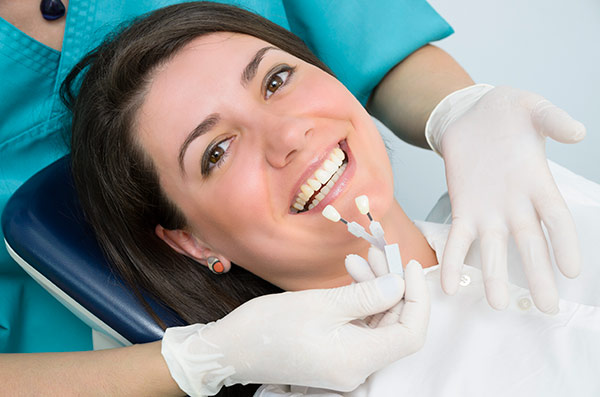Did you know that a majority of middle-age adults are missing one or more teeth? Often these missing teeth are caused by an accident, tooth decay, gum disease or dental injuries. With the advanced technology and care today, there is no reason to go through life with missing teeth! Read on for a comparison of implants vs dentures and decide what’s right for you!
What are Implants?
Dental implants are artificial teeth that are connected directly to your jaw bone. In appearance, they look like natural teeth, unless you have significant pre-existing gum disease and bone loss. They consist of a cap and cylinder attached to a titanium screw. Dental implants are a surgical procedure and require a healthy jawbone and gum line.

The Dental Implant Procedure
Getting dental implants is a surgical procedure. Speak to your dentist if you are considering implants, as it requires good oral health. Depending on your situation, your dentist may recommend local or general anesthesia.
There are three phases in the dental implant procedure following a cone beam CT evaluation (CBCT). In phase one, you will undergo surgery to place the implant in your jaw. The healing process from this phase is three to six months. In phase two, your dentist will attach a post to the implant. Again, healing will need to take place for several weeks in order to allow the gum tissue to grow around the implant and post.
The last phase in the process is where the crown is attached to the implant. Crowns are customized for your individual smile and the strength of chewing is the same as or more than your natural teeth.
What Are Dentures?
Dentures are false teeth that adhere to your jaw through the use of suction to the gum tissue. In the worst-case scenarios, dental adhesives are used. It’s true that adjusting to life with your new dentures will take some getting used to. Here are some things you can expect:
How will my new dentures feel?
People with new dentures often say they feel like the dentures are too big for their mouth. Another complaint is that dentures can cause them to gag or bite their cheeks or tongue, or they speak a little differently at first. Not to worry! Over time, this feeling will lessen. Your tongue will eventually get used to the new object in your mouth and you will speak better too. For lower dentures to be stable, Dr. Larry recommends dental implants to secure the denture into place.
You may also experience some soreness and an increase in saliva as your body adjusts to dentures. These symptoms too should decrease with time. Expect several appointments for adjustments to make the base fit your gum tissue evenly. These appointments will also serve to even the bite.
However, if you are in pain for discomfort for an extended period of time, contact your dentist immediately!
How will eating be different with dentures?
New dentures are an adjustment. During this time, you may find that you have trouble sensing hot and cold food and beverages. Use caution not to burn yourself. Nothing lasts longer than the sensation of a burned tongue!
You may also experience a lack of taste in foods you enjoy. As your body accepts your new dentures, these sensations and experiences will start to return to normal. Remember to start with soft foods and small quantities.
You will also not be able to bite food with as much force. Chewing strength will be almost 80 percent of your normal strength, one of the definite drawbacks to choosing dentures.
Will I still sound like me when I talk?
It’s true that wearing dentures will change the way you sound. However, this change is much more noticeable to you than others! As you know, sound is carried to your ears through vibrations in the jaw bone and even non-denture wearers detect a difference in how they sound to themselves versus a recording of their voice.
It will take practice to master speaking with your new dentures. Give it time and remember that the muscles in your lips, cheeks, and tongue are working together to hold your dentures in place while you speak. Try speaking more slowly and use a good denture adhesive to keep everything in place, if absolutely necessary.
We recommend lower dental implants to help hold new dentures in place, otherwise the denture will loosen when eating or talking.
Caring for Your Dentures
While dentures aren’t your real teeth, they’re just as susceptible to bacteria and stains. When plaque builds on your dentures, it will affect the tissue underneath. Defend your gums and dentures by treating them just as you would your normal teeth – brush them every day. It can be simple to care for your dentures and avoid common mistakes.
Dental Implants vs Dentures: Which is right for you?
Today there are lots of great options when it comes to repairing your missing teeth. Dental implants and dentures are the most common options and selecting the right dental solution depends on your own oral health and preferences.
Dental implants are replacement teeth that are implanted surgically into your jaw bone. As long as you have a healthy jaw and gums, implants may be the best choice for you. With proper care, they often can last for decades, allowing you to enjoy a lifetime of chewing comfort. Additionally, bone gradually shrinks when a tooth is lost, but a dental implant helps prevent or minimize the loss of supporting bone in the jaws.
Dentures are false teeth that are secured in place with or without adhesive. If you have gums or a jaw that is not in tip-top shape or is unhealthy, then dentures may be the best option for you. Chewing strength and potential discomfort is much greater with dentures.
Dr. Larry and the Schmakel Smile Design team are here to help you evaluate your oral health and choose the right solution to your missing teeth!

Considering Dentures or Dental Implants? Schedule an Appointment!
The dental professionals at Schmakel Smile Designs can answer your questions and provide a thorough examination to help keep your flawless smile. Make an appointment, or call us at (419) 841-9494.
We are proud to be your dentist in Toledo, near Sylvania. For more information about what we do, contact Schmakel Smile Design:
Phone: (419) 841.9494
Email: [email protected]
Website: www.toledodentistry.com.
Find us on Facebook | LinkedIn | Twitter | YouTube | Google+













